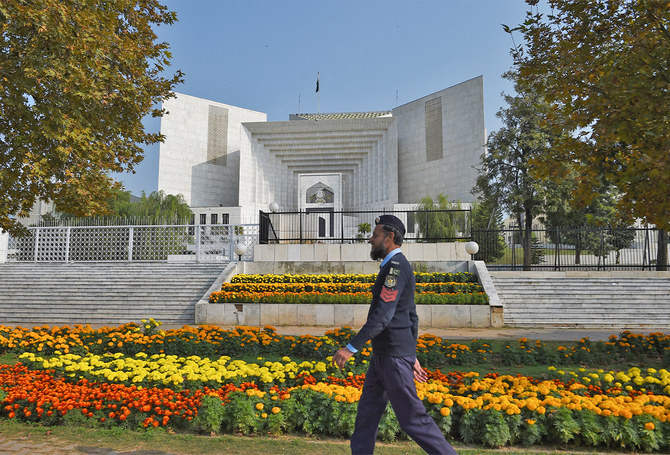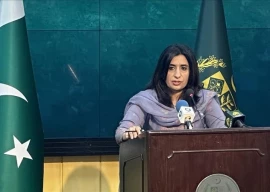
The counsel for the Balochistan government on Tuesday informed a five-judge Supreme Court bench, headed by Chief Justice Umar Ata Bandial, that the presidential reference regarding the Reko Diq agreement was maintainable because it was a matter of public interest.
Lawyer Salahudin Ahmed also informed the bench that despite elaborating dire consequences, a three-judge bench of the apex court led by then chief justice Iftikhar Muhammad Chaudhry did not stop the proceeding and declared the Reko Diq deal as void in 2013 which became the cause of $10 billion award against Pakistan by the International Centre for Settlement of Investment Disputes (ICSID).
During a hearing of the presidential reference, the court wondered why the bench scrapped the deal after the rejection of complainant Tethyan Copper Company’s (TCC) application regarding grant of the mining lease by the Balochistan government in 2012.
Ahmed stated that the court was informed that the matter was pending before the ICSID but former chief justice Iftikhar Chaudhry-led bench did not stop and give the judgment wherein the whole deal was declared as void in January 2013.
Additional Attorney General Chaudhary Amir Rehman also told the court that the bench had asked the parties to convey to the ICSID to stay its proceeding as the matter was being heard by the apex court in Pakistan.
However, Rehman added, the ICSID refused to stay its proceeding because the tribunal had already been constituted to take up the TCC’s complaint against the rejection of the mining lease by the Balochistan government.
Ahmed read out to the court the contentions of senior counsel Khalid Anwar, who was representing the TCC at that time regarding the dire consequences if the Reko Diq deal was declared as void. He added that Anwar’s contentions were mentioned in the court’s judgment.
According to the 2013 judgment, Khalid Anwar argued that if the TCC were granted the mining lease, the petition would still be maintainable because the apex court could then declare that everything, including relaxation, was illegal and strike it down, for which the court had the jurisdiction.
However, if they had refused to grant it, there would be no complaint against them to be agitated before this court unless the court had given the findings that the international arbitration clause of CHEJVA was illegal and unconstitutional; ICSID and ICC arbitration should not have taken place; and the verdict, if any, given by the arbitrators would be null and void.
Anwar had requested the court not to give such a finding and suggested that the proper course for the court would be to wait for the outcome of the proceedings being carried out under the Pakistani laws – the Arbitration (International Investment Disputes) Act, 2011, the Recognition and Enforcement (Arbitration Agreements and Foreign Arbitral Awards) Act, 2011, and the Fourth Schedule to the Constitution of Pakistan under which the International Arbitration Treaties were binding upon the government of Pakistan.
“According to the learned counsel, that would be the best, clearest, fairest and most transparent approach, which would restore the confidence of foreign investors in Pakistan as a safe environment for their investments and there would be no conceivable allegations that the agreement was struck down after the discovery had been made,” the judgment had said.
“He urged that Pakistan should stand up for its commitments under the bilateral treaty read with ICSID clause, which the State of Pakistan has accepted voluntarily and freely, and that this Court should not put its prestige on the line,” it added.
The then chief justice, Iftikhar Chaudhry, had noted in his judgment that the objection raised by the counsel for TCC, was therefore not tenable. “On 08.02.2011, this Court directed the production of the entire record relating to CHEJVA. The said record was retrieved and filed through several applications,” the judgment said.
“It made shocking disclosures of extensive irregularities and corruption. The Government examined the same and decided not to defend the said acts and accordingly it decided to render full assistance to this Court from the record that was filed,” the judgment continued.
“Further, this Court has always emphasized that the government functionaries must perform their functions in accordance with law,” it said and mentioned that the court had wide powers in terms of Article 184(3) of the Constitution to oversee the acts/actions of the other organs of the state, namely, executive and legislature.
“It is also settled that under the principle of trichotomy of powers, the Judiciary plays a crucial role of interpreting and applying the law and adjudicating upon disputes arising among governments or between State and citizens or citizens inter se,” the ruling added.
The ruling further said that the Judiciary was entrusted with the responsibility for enforcement of fundamental rights, which called for an independent and vigilant system of judicial administration so that all acts and actions leading to infringement of fundamental rights were nullified and the rule of law was upheld in the society.
The court also said that the discharge of constitutional duty by the state functionaries in deviation to the spirit of the Constitution could be anvil to the Constitution and was challengeable on diverse grounds, including mala fide and colourable exercise of the power in bad faith for an ulterior motive.
“It is difficult to confer validity and immunity to the mala fide act or action from judicial scrutiny in the exercise of power of judicial review which is inherent in the superior courts.” The counsel said that the presidential reference was maintainable as it was a matter of public interest.
The hearing of case was adjourned until Wednesday (today).




1730884134-0/BeFunky-collage-(26)1730884134-0-165x106.webp)





1730379446-0/WhatsApp-Image-2024-10-31-at-17-56-13-(1)1730379446-0-270x192.webp)
1730985983-0/Express-Tribune-Web-(28)1730985983-0-270x192.webp)






COMMENTS
Comments are moderated and generally will be posted if they are on-topic and not abusive.
For more information, please see our Comments FAQ